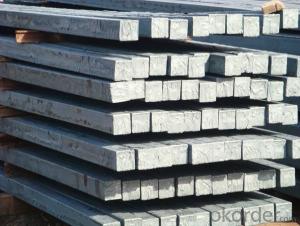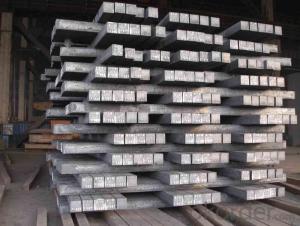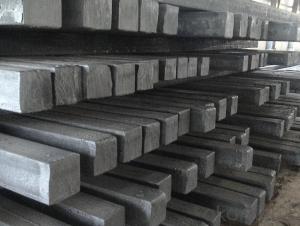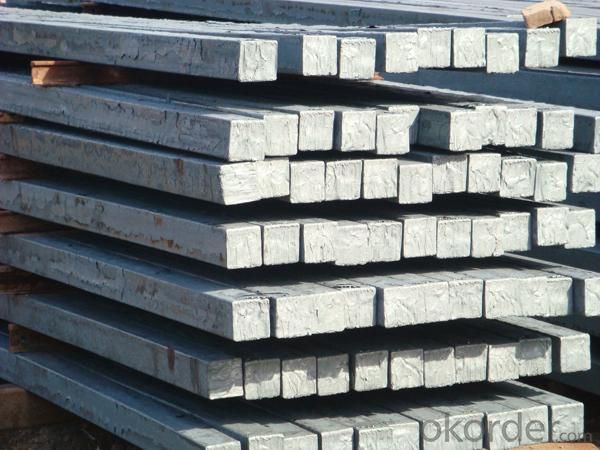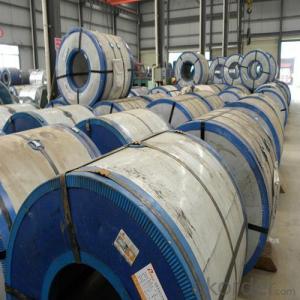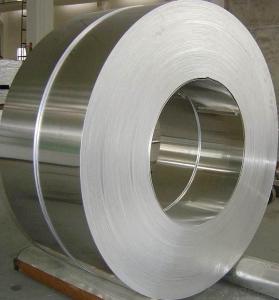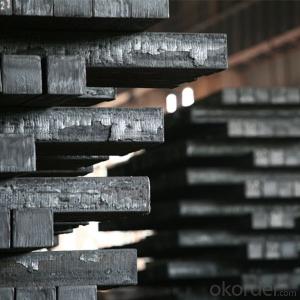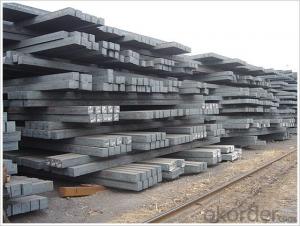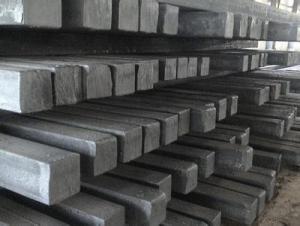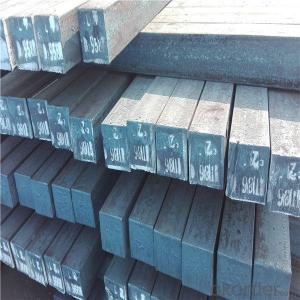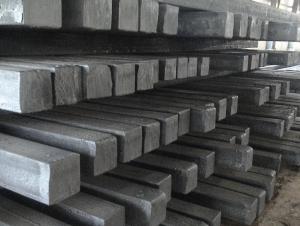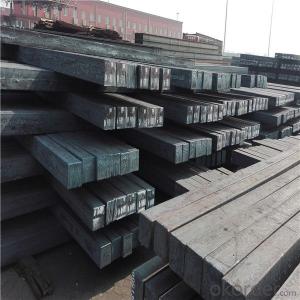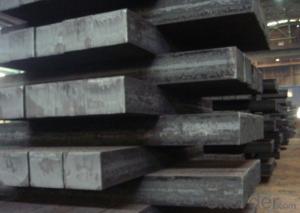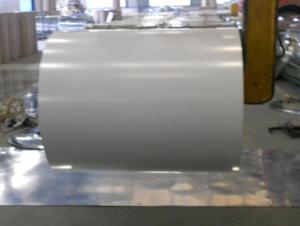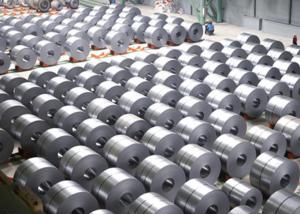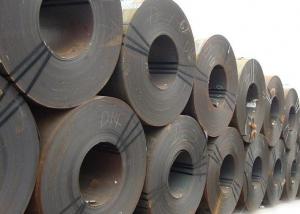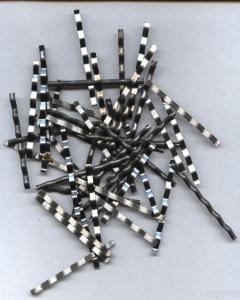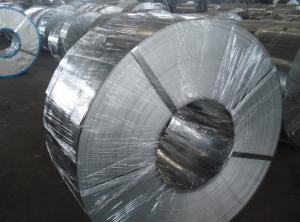hot rolled square steel billet
- Loading Port:
- China Main Port
- Payment Terms:
- TT OR LC
- Min Order Qty:
- -
- Supply Capability:
- -
OKorder Service Pledge
Quality Product, Order Online Tracking, Timely Delivery
OKorder Financial Service
Credit Rating, Credit Services, Credit Purchasing
You Might Also Like
square steel billet
1.3SP, 5SP
2.terms of payment: L/C at sight
3.size: 120*120mm
4.length: 5.8~12m
square steel billet
Specifications
square steel billets
1)We procure world class quality steel billets which meets the specific requirements of the clients
The Billets produced by the company can be broadly divided into three main types i.e.
M.S. Billets
CRS Billets
Special Alloy Billets
M.S. Billets are used for rolling of TMT Re-Bars of Fe415 and Fe500 Grade and various other structural steel products.
CRS Billets are used fro rolling of CRS TMT Re-Bars.
Special Alloy Billets are used for rolling of any special grade TMT Re-Bars like Earthquake resistant TMT Re-Bars and for special grade structural steel products.
The following are the sizes of Billets available with Shyam Steel Industries Ltd.:
100 X 100
120x120
150 X 150
Physical Properties:
Description
As per IS 2830
Shyam Billets
Bend (max.) 5 mm per meter >= 5 mm per meter
Carbon (max.) 3mm per meter >= 3 mm per meter
Length 3 mt - 13 mt 3 mt - 9 mt
Chemical Properties:
Ladle Analysis:
Designation
Carbon
Manganese
C15 0.12-0.18 0.30-0.60
C18 0.15-0.21 0.30-0.60
C20 0.17-0.23 0.30-0.60
C15 MMn 0.12-0.18 0.60-1.00
C18 MMn 0.15-0.21 0.60-1.00
C20 MMn 0.17-0.23 0.60-1.00
C15 HMn 0.12-0.18 1.00-1.50
C18 HMn 0.15-0.21 1.00-1.50
C20 HMn
0.17-0.23 1.00-1.50
Billets of different designations are manufactured in three different grades namely A, B, C having sulphur, phosphorous content (on ladle analysis) and carbon equivalent as follows:
Chemical Analysis:
Grade Sulphur Phosphorous Carbon Equivalent (CE)1
Max Max Max
A 0.05 0.05 0.42
B 0.045 0.045 0.41
C 0.04 0.04 0.39
- Q: What are the different types of steel forgings and castings?
- There are several different types of steel forgings and castings, including open-die forgings, closed-die forgings, and rolled-ring forgings. In terms of castings, there are sand castings, investment castings, and die castings. Each type has its own unique characteristics and benefits, making them suitable for different applications and industries.
- Q: What are the applications of steel mesh in architectural facades?
- Steel mesh is commonly used in architectural facades for a variety of applications. Firstly, it provides a visually appealing and modern aesthetic to buildings, enhancing their overall design. Secondly, steel mesh can act as a sunshade, reducing solar heat gain and improving energy efficiency. Additionally, it can serve as a protective barrier, preventing unauthorized access while still allowing for natural ventilation and light transmission. Lastly, steel mesh can be used as a cladding material, adding texture and depth to the facade. Overall, the applications of steel mesh in architectural facades are numerous and contribute to both functional and aesthetic aspects of building design.
- Q: How is steel pipe coated for corrosion protection?
- Steel pipe is coated for corrosion protection through a process called galvanization. In this process, the pipe is first cleaned and then immersed in a bath of molten zinc. The zinc coating acts as a barrier between the steel and the surrounding environment, preventing corrosion and extending the lifespan of the pipe.
- Q: How is steel rebar used in concrete construction?
- Steel rebar, also known as reinforcing bar, is used in concrete construction to provide additional strength and stability to the concrete structures. It is placed within the concrete forms prior to pouring the concrete and acts as a reinforcement by absorbing tension forces and preventing cracks and failures. The rebar is strategically positioned to distribute the load evenly and enhance the overall structural integrity of the concrete.
- Q: What are the different types of steel channels?
- The different types of steel channels include C-channel, U-channel, and hat channel.
- Q: How is steel wire used in the manufacturing of springs?
- Steel wire is commonly used in the manufacturing of springs due to its high tensile strength and flexibility. It is typically coiled or bent into the desired shape, allowing it to store and release energy when pressure is applied. The steel wire's resilience and durability make it an ideal material for creating springs that are used in various applications, such as automotive suspensions, mattresses, and mechanical devices.
- Q: How is steel used in the production of oil and gas pipelines?
- Steel is used in the production of oil and gas pipelines due to its exceptional strength and durability. It is commonly used as the primary material for constructing pipelines because it can withstand high-pressure conditions and extreme temperatures. Additionally, steel is resistant to corrosion, making it ideal for transporting oil and gas over long distances.
- Q: How is steel used in the construction of infrastructure projects like roads and bridges?
- Steel is commonly used in the construction of infrastructure projects like roads and bridges due to its strength, durability, and versatility. It is used to create beams, columns, and girders that provide structural support and stability to bridges and overpasses. Additionally, steel is used in reinforcing concrete structures, such as roads and bridge decks, to enhance their strength and prevent cracking. Moreover, steel is also used in guardrails, signposts, and cables, ensuring the safety and functionality of these essential infrastructure projects.
- Q: What are the different types of steel wire ropes and their uses in offshore drilling operations?
- There are various types of steel wire ropes used in offshore drilling operations, including drilling lines, sandlines, and guy wires. Drilling lines are high-strength ropes designed to support the weight of the drill string and facilitate drilling operations. They are commonly used to hoist heavy equipment and maintain tension during drilling. Sandlines, on the other hand, are smaller diameter wire ropes used to lower and retrieve tools and equipment into the wellbore. They are primarily utilized for well servicing operations such as swabbing, wireline logging, and well cleanouts. Guy wires are used to provide stability and support to offshore drilling structures, ensuring they remain upright and resist external forces like wind and waves. These ropes are typically employed in the construction and maintenance of offshore platforms and drilling rigs. Overall, steel wire ropes play a vital role in offshore drilling operations by providing strength, reliability, and flexibility for various tasks, ranging from hoisting heavy loads to maintaining structural integrity in challenging offshore environments.
- Q: What are the different types of steel tanks and their applications?
- There are several different types of steel tanks, each designed for specific applications. Some common types include: 1. Welded Steel Tanks: These tanks are constructed by welding steel plates together to create a strong and durable structure. They are commonly used for storing liquids such as water, oil, or chemicals. 2. Bolted Steel Tanks: These tanks are made by bolting together prefabricated steel panels. They are versatile and can be easily disassembled and moved if needed. Bolted steel tanks are often used for water storage, wastewater treatment, and industrial applications. 3. Stainless Steel Tanks: These tanks are made from corrosion-resistant stainless steel, making them ideal for storing substances that could react with other metals. They are commonly used in the food and beverage industry, pharmaceuticals, and chemical processing. 4. API 650 Tanks: These tanks are designed according to the standards set by the American Petroleum Institute (API). They are used for storing oil, gas, and other petroleum products. API 650 tanks are known for their reliability and durability. 5. Pressure Vessels: These steel tanks are built to withstand high pressure and are used to store gases or liquids at a higher pressure than atmospheric pressure. They are commonly used in industries such as oil and gas, chemical processing, and power generation. 6. Underground Steel Tanks: These tanks are designed to be buried underground and are used for storage of fluids like gasoline, diesel, or chemicals. They are often used in gas stations, industrial sites, and residential areas. Each type of steel tank has its own specific applications and advantages, ensuring that there is a suitable option for various industries and storage needs.
Send your message to us
hot rolled square steel billet
- Loading Port:
- China Main Port
- Payment Terms:
- TT OR LC
- Min Order Qty:
- -
- Supply Capability:
- -
OKorder Service Pledge
Quality Product, Order Online Tracking, Timely Delivery
OKorder Financial Service
Credit Rating, Credit Services, Credit Purchasing
Similar products
Hot products
Hot Searches
Related keywords
